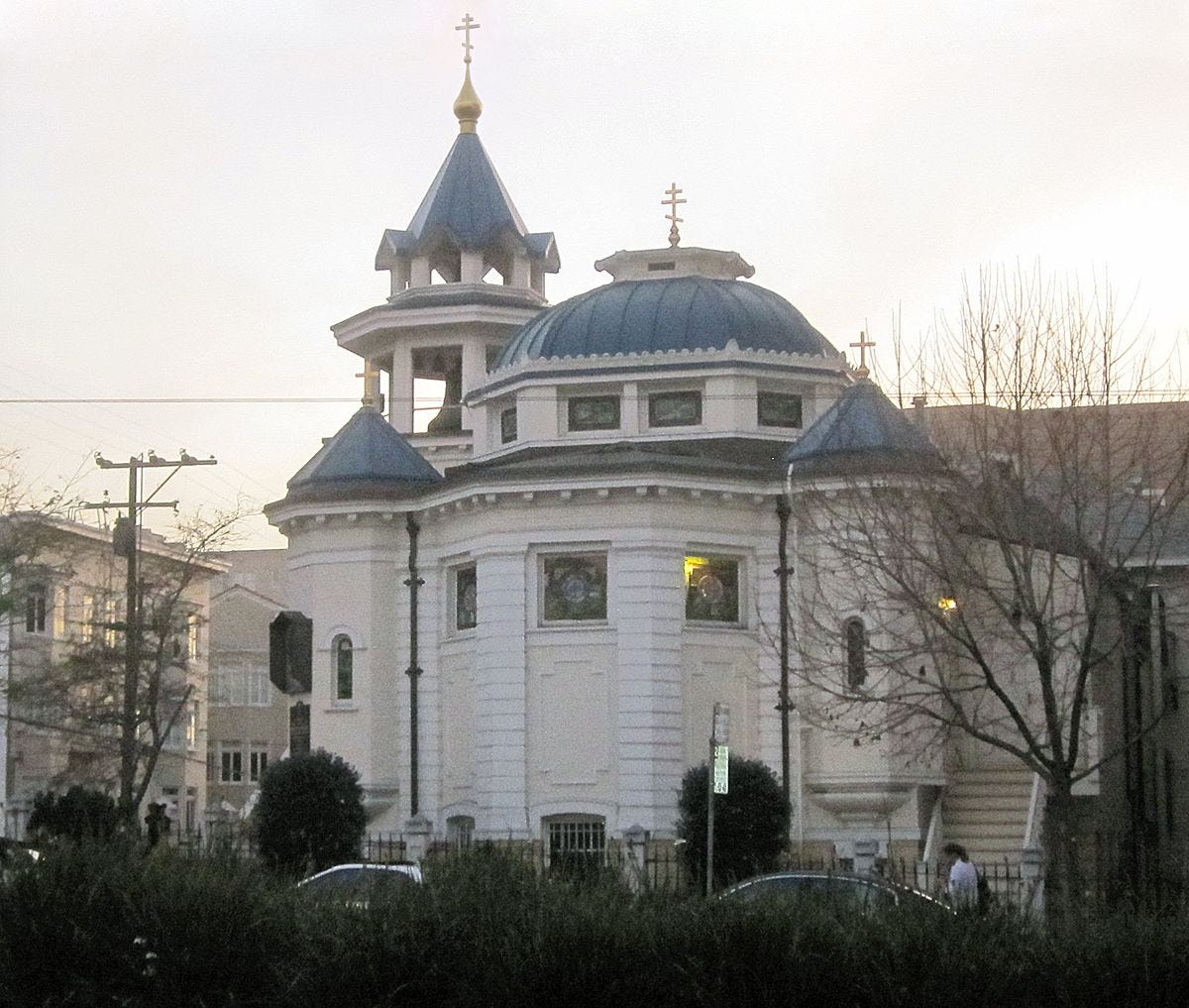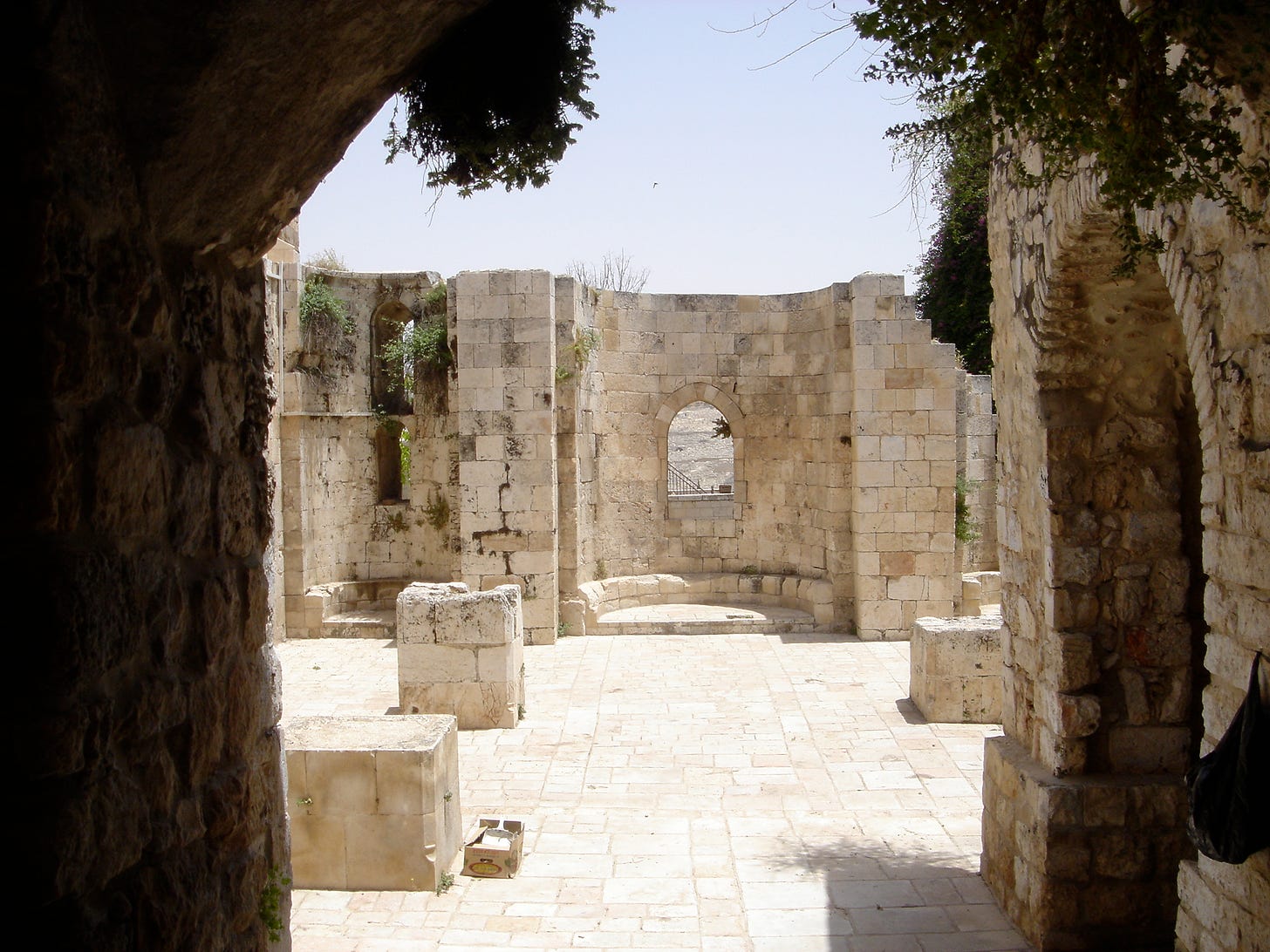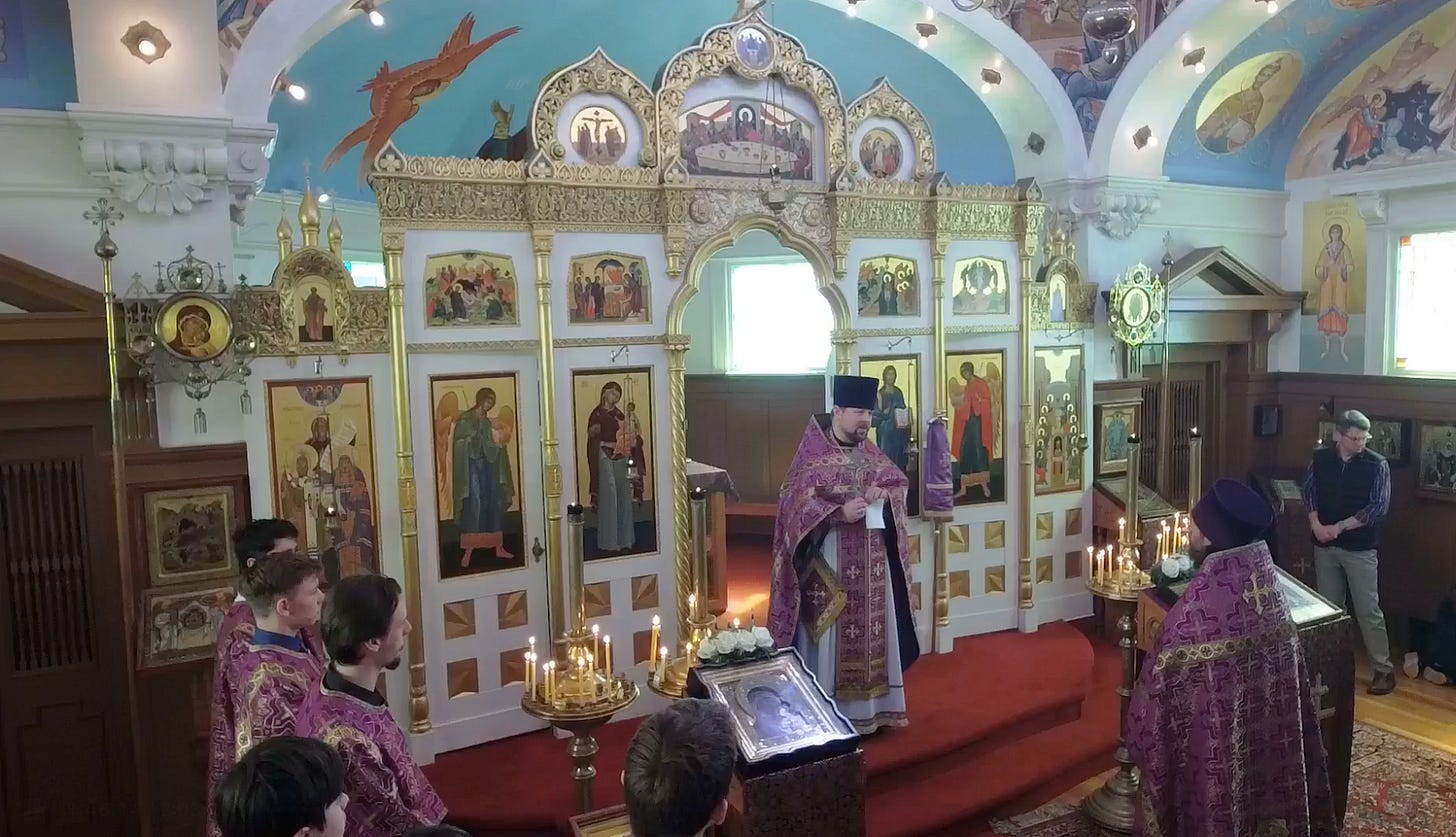Participating in the Liturgy at Holy Trinity Cathedral in San Francisco
Flirting with Orthodoxy in America
This morning my friend Edward and I attended the Divine Liturgy of St. Basil the Great at Holy Trinity Cathedral in San Francisco, part of the Orthodox Church in America. We are cooking up another podcast to follow our discussion of “The Spiritual Mission of America” a few months ago. I imagine we’ll both have more thoughts to share about Orthodox ritual and theology when we record that. But for now I wanted to share some of my immediate reflections.
This was my first Orthodox liturgy. There will definitely be a second.
For years I’ve been searching for a church community where I could root my faith, a place that could hold the spiritual impulse I first encountered when I was 19. As I’ve written about elsewhere, it was twenty years ago that I had a sudden and unsolicited experience of Christ, the Logos. This Being manifested not so much to me as if from outside but from within me, through me, for me. It was not one of those psychedelic experiences where one imagines that they are the messiah. At no point did the distinction between me and the Savior become blurred. The Face of the Lord was pressed against the inscape of my own, but we did not merge. It was a relation. As I now see it, it is The Relation. Christ’s presence was overwhelming yet healing, an offering of infinite intimacy, a revelation that called me to revise everything I thought I knew about who I am and what this world is all about.
It was not the sort of healing that takes wounds away. It is the sort that transforms wounds into sources of wisdom and love. Similarly, the encounter did not give me any new or final answers. It did not leave me with a complete explanation of God, the world, or myself. But I cannot shake the conviction that something was personally revealed to me, though I have no common words sufficient to justify it or even adequately define it to anyone else. I can only claim that this Christophany turned my attention to the right questions.
Despite how powerfully this experience reoriented my center of axiological gravity, I’ve struggled to find an institutional form of Christianity that doesn’t feel like a diminishment in comparison. Over time, I’ve only grown more convinced that personal revelation, while precious, needs collective form. It needs a vessel, a communal body through which it can mature, deepen, and extend itself through time. Otherwise, it risks becoming private myth or fading memory. I’ve spent time at Episcopal churches, and gone as far as the Old City of Jerusalem and the Goetheanum in Dornach, Switzerland looking for it. But nothing quite aligned. Too often, I sensed a rigidity, or a conceptualization or legalization of mystery that seemed to over-determine it.
Whether I will find “it” in Orthodoxy I cannot yet say, but I admit I was deeply moved by the liturgy today. The nave was full: young families, children running around, people arriving late and still reverent. There was a lived-in sacredness, something ancient yet vibrantly present. Potent prayers, chanting, incense, a semantic cascade of icons, and the ritual drama of revelation and concealment. The curtain and Royal Doors of the iconostasis would open and close at key moments, subtly choreographing our encounter with divine mystery.
The iconostasis—the wall of icons separating the nave (where the people gather) from the sanctuary (the altar space)—represents the boundary between the visible and invisible realms, creation and Creator. It marks, as St. Maximus might say, the incarnational portal between the logoi of creatures and the Logos of God. It separates not to exclude, but to mark the passage of a crucial threshold.
Paul's letter to the Galatians (3:28) was read:
“There is neither Jew nor Gentile, neither slave nor free, nor is there male and female, for you are all one in Christ Jesus.”
The ritual carries a rhythm not only of words and embodied movement but of veiling and unveiling. The closing of the curtain before the Anaphora (the Eucharistic prayer) especially struck me. The curtain felt not so much a barrier as a gesture of reverence, a recognition that what was taking place—Christ offering the Gifts—was not something to be casually looked upon. It is not that God remains entirely hidden, but that God is always more than what is revealed.
Then the Great Entrance, the Elevation of the Gifts, the Communion: the curtain would open, and the sanctuary would be visible again. The priest’s movement in and out of the doorway was a ritual enactment of the Incarnation: God concealed in glory, then revealed in humility, then again concealed in the depths of divine mystery, only to be revealed again in the broken bread and shared cup.
This rhythm of showing and hiding, of approaching and withholding, felt like the breath of spirit itself, an ancient heartbeat tracing its origins back through the Christ event to the ancient mysteries which heralded it. Not everything is given at once. Revelation is gradual, reciprocal. It waits for our eyes to adjust. It is not a floodlight flashing on but a ripening dawn.
I didn’t take communion. In the Orthodox Church, that would require baptism and full participation in the sacramental life. But someone noticed I was new and offered me a piece of the blessed bread afterward. Others introduced themselves too. Even the priest remarked on how many unfamiliar faces were present. It seems that something is stirring, not only in me, but in others. A stirring not just for spirituality or because of personal spiritual experiences; but a hunger for ritual life, for a community bound not by ideology but by shared participation in the Mystery.
I have always been drawn to the Catholic Church for its ritual life. But the shadows felt too dark for me, and its legalistic morality and Augustinian conceptions of sin turned me off. The Orthodox Church’s theology is unabashedly apophatic, rooted in silence as much as in speech, in grace more than sin, in gesture as much as in doctrine. And while I have many theological and philosophical nitpicks, and likely always will, I am increasingly convinced that philosophy must follow ritual, not precede it. The liturgy is not a symbol of what might be true; it is the actualization of Truth in time. It is the divine becoming flesh again, not as a concept but as co-creation.
God is the fullness of time. This is not a God who stands above history, but one who pours themselves out to fill history with fluid meanings, who finds freedom in every creature but also curves creation toward a Highest End, and whose greatest power is to transfigure death into Love.
Today reminded me that the deepest truths cannot be possessed or known alone. They must be received, and received together.








My husband was a lifelong Catholic until, sickened by the abuse, he wrote to the bishop of our diocese about what was being done and how he might support the Church in its efforts at reform. He received a standard reply scripted by a public relations firm that had been hired to do this. Arriving at the church door one Sunday, he said "Cleo, I can't go in there." I remebered that our friends like the newly formed American Orthodox congregation near us. we went and found ourselves very at home. My husband joined that church in the last years of his life (I did not for largely contingent reasons) and it was a great support to us. The beauty of the liturgy overwhelmed us. And my own theology is shaped prinarily by the work of David Bentley Hart (q.v. https://substack.com/@davidbentleyhart?utm_source=top-search and his magnum opus Roland by Moonlight) so there you are. It was lovely to read this. Please tell us how it continues to land for you going forward.
This is an excellent recap of your first Liturgy, wow! I am not surprised that you feel a pull to Orthodoxy, with it’s apophatic theology. As rigid as it might seem on the exterior, there is a gentleness in the theology that creates a surprising amount of flexibility. There is a saying, “Orthodoxy is paradoxy,” which always keeps me oriented in the right direction. I look forward to hearing more!